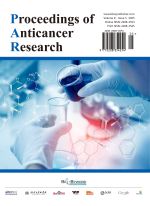Key Driving Pathways and Regulatory Mechanisms of Malignant Transformation of Mammary Gland Epithelial Cells under Long-Term Psychological Stress
Abstract
Objective: This study primarily focuses on analyzing the inductive effects of emotional disturbances on the malignant transformation process of mammary gland epithelial cells. Methods: A total of 42 patients with malignant transformation of mammary gland epithelial cells (breast cancer, observation group) and 42 patients without malignant transformation of mammary gland epithelial cells (non-breast tumors, control group) were selected as research subjects. The earliest consultation time was January 2022, and the latest was January 2024. The extent of psychological stress impact on these patients was compared. Results: Compared with the control group, the observation group experienced a higher frequency and intensity (LEU value) of adverse life events, with P < 0.05. The intensity of adverse life events in the observation group, except for mild events, was significantly higher than that in the control group (P < 0.05). In terms of the content distribution of adverse life events, the proportion of marital and family problems in the observation group was significantly higher than that in the control group (P < 0.05). The negative coping score and positive coping score in the observation group were significantly different from those in the control group (P < 0.05). Regarding social support, the objective support score in the observation group was higher than that in the control group (P < 0.05). Conclusion: During the malignant transformation process of mammary gland epithelial cells, long-term emotional disturbances have a significant impact, indicating a close relationship between psychological stress and the occurrence of breast cancer.
References
Han E, Zhang Z, Nie Y, et al., 2025, The Impact of Whole-Process Intervention Combined With Positive Psychological Suggestion Under the Principle of Crisis on the Psychological State, Stigma, and Treatment Adherence of Breast Cancer Patients. Advances in Cancer, 23(16): 1976–1979.
Wu S, Chen S, 2025, The Impact of Multimodal Nursing Based on the WeChat Platform on the Quality of Life and Depressive Mood of Postoperative Breast Cancer Patients. Journal of Women and Children Health, 4(15): 130–135.
Li Q, Sun H, Jiang X, 2025, The Impact of Nursing Based on Empowerment Theory and Behavior Change on the Social Function and Psychological Mood of Female Postoperative Breast Cancer Patients. Journal of Clinical Research, 42(07): 1272–1275.
Zhao Y, Zhang S, Li R, 2025, The Impact of Diversified Intervention Based on Nursing Aesthetics on Post-Traumatic Growth and Satisfaction With Postoperative Aesthetics in Patients Undergoing Radical Mastectomy for Breast Cancer. Chinese Journal of Aesthetic Medicine, 34(05): 58–61.
Jiang L, Chen J, Hua L, et al., 2025, The Impact of Family-Centered Continuous Positive Psychological Intervention on the Postoperative Psychology and Quality of Life of Breast Cancer Patients. Chinese Journal of Clinical Healthcare, 28(02): 234–238.
Yang Q, Li S, Li H, et al., 2025, Meta-Analysis and GRADE Evaluation of the Impact of the Solution-Focused Model on Perioperative Negative Emotions and Quality of Life in Breast Cancer Patients. Gansu Medical Journal, 44(02): 159–163.
Tang Z, Ma D, Yang Y, 2024, The Impact of Personalized Intervention Based on Risk Management on Negative Emotions, Pain Levels, and Quality of Life in Patients Undergoing Modified Radical Mastectomy for Breast Cancer. Advances in Cancer, 22(24): 2726–2729.

